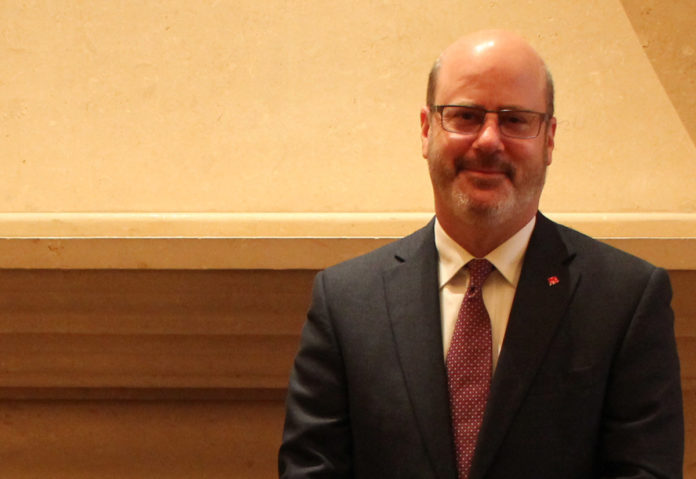To celebrate the 150th anniversary of the establishment of Canada,
the Consulate General of Canada brought representatives from its various programs to Macau, sharing information and opportunities on trade, investment, education and tourism. Consul General Jeff Nankivell sat down with Business Daily to discuss the role of the Consulate in an ever-changing political climate, and what to look forward to in the year ahead.
What are the main objectives of this trip to Macau?
It’s an effort to achieve a kind of a critical mass. Our objective […] is to use the opportunity of the 150th anniversary of Canada’s establishment as a country to bring awareness about Canada in Macau to a new level. I would say our target audience is business people in Macau who are looking to buy goods and services from Canadian suppliers. It would be people in the entertainment industry who are looking to source new and exciting entertainment products from Canadian suppliers that can help them to have a competitive edge in the market for tourists who are coming to Macau for entertainment. For people in the food and beverage sectors and the hospitality industry and hotels and restaurants, to be learning more about our great Canadian food and beverage products, so that they can offer that also – to give them a competitive edge in a very dynamic marketplace.
How large is the Canadian population in Macau and Hong Kong?
We estimate about 4,000 Canadian citizens resident in Macau. It’s hard to tell exactly. We issue about 540 passports a year.
[Also] I was very interested to learn this: Canadians are the third largest nationality group visiting Macau from a long distance.
Our estimate for Hong Kong is 300,000 Canadian citizens. It’s almost a fifth of Hong Kong’s [population]. In Hong Kong we issue about 29,000 passports a year.
That’s our largest passport issuing office abroad.
Why is there such an interest from Hong Kong citizens to move to Canada?
There was, in the early 90s, a very open policy in Canada for people to emigrate from Hong Kong, and large numbers did. We estimate the population in Canada at about 500,000 people of Hong Kong origin.
There have been people from southern China – Hong Kong, Macau, southern Guangdong – who have been going to Canada for around 150 years, so there were already established connections.
Has Canada’s foreign policy had to change at all based upon the changes happening in the U.S.?
I wouldn’t say that Canada’s global foreign policy has changed at all. I think what you’ve seen from Prime Minister Trudeau and from our cabinet, since the change of administration in the U.S., is a restatement of established Canadian policies.
You’ve seen Canadian ministers reaffirming Canadian policies and, if there are leaders in other parts of the world who are talking about other types of policies, then people look at what the Canadians are saying and they make their own comparisons. But I wouldn’t say there’s been a shift.
Of course the government in Canada is paying a lot of attention to the relationship with the United States. The new administration, under President Trump, has stated it wants to look at the trade agreement governing free trade in North America, and our government has said that we’re open to looking at how we can make that trade agreement better. And that process will now begin.
We have a border between the U.S. and Canada where roughly US$2 billion dollars of goods are crossing that border every single day; US$2 billion of goods in both directions crossing the border.
It happens to be the case, that in the United States, 35 of the 50 states have Canada as their number one market for exports. So, the U.S. trade relationship with Canada is one that’s very beneficial to the United States. Our trade is roughly in balance and so it’s a mutually beneficial trading relationship where, we have an estimate, something like nine million jobs in the U.S. depend on exports to Canada.
So there’s a lot at stake for Americans when they look at the trade relationship with Canada.
How much strain is the U.S. pulling out of the TPP putting on trade relationships that Canada has?
I wouldn’t say that it’s putting strain on those relationships. In the case of the TPP, this was the United States withdrawing from a treaty that had not come into effect yet. So there was nothing happening that has to be reversed.
So for us, it’s an agreement that we worked on, we are very keen as a nation on expanding free trade around the world. We have access as a country through the North American Free Trade Agreement (NAFTA) and through the newly signed Canada-Europe Trade Agreement. We have the largest free trade access of any country, having access within North America and to the entire EU market through these arrangements. And in the Pacific we will continue to work on other mechanisms, other than the TPP.
But in the meantime, we have announced that we are launching exploratory talks with China, looking at the potential on both sides for the gains that could come from a free trade agreement or a comprehensive economic trade agreement. We continue to have discussions with India about a comprehensive economic partnership agreement. We have a newly-come into effect last year, free trade agreement with the Republic of Korea.
Where else is Canada focusing on in Asia Pacific?
What we’ve had in China and India is new trade offices, so they’re not Consulates, but they’re satellite offices of Consulates, and we’re opening several new ones in each of those two countries.
We’re going to continue to work on expanding relations with China. Exploratory talks have now started on the possibility of some kind of a free trade arrangement with China. We continue to be in talks with India. Those are both huge potential markets, and already important markets for us.
We are [also] going to continue to work on the opportunities coming from the Canada-Korea free trade agreement, which went into affect about a year ago.
[In addition], the Japan economic relationship is very important to Canada, and we continue to work at expanding that.
A new office that we created in 2016 was a new separate ambassador to the Association of South East Asian Nations (ASEAN) – based in Jakarta, where ASEAN has its secretariat. So that’s 10 important economies in Southeast Asia that are growing well; tremendous potential markets there.
What are your regional goals?
In Macau and in Hong Kong – the areas that we cover from my office – we are really looking at ways that we can help to bring more Canadian small and medium enterprises into the markets here and also to use Hong Kong and Macau as a platform for these Canadian businesses to expand their business in Asia.
We also have a special focus on helping to attract new foreign direct investment from this region into Canada, to help to build new infrastructure in Canada, to help to finance the innovative sectors of our economy where we have very exciting opportunities in areas like artificial intelligence, financial technologies, health technologies, education technologies, agricultural technologies – where we have a very vibrant start-up scene in Canada and an active venture-capital ecosystem.
And we are working at raising awareness in this region, southern China, Greater China, about the opportunities for investors to participate in the growth of that innovation in Canada. And we’re starting to grow new companies that will be global champions. And we want people to know here that they have an opportunity to get in on that.
When trying to attract investment from here to Canada and promote businesses to come here – is that weighted one way or the other?
At the end of the day, it’s going to be up to the businesses themselves. These are private matters. It’s for the businesses and the investors to work out what the balance is.
We see bringing Canadian companies into the market here as absolutely essential if these companies are going to be global players. If you’re going to grow to be global players, you have to be in Asia. If you’re going to be in Asia, you need to have a place in Asia as your base for doing business here. And certainly the Pearl River Delta is one of the prime locations to do that.
What types of services does the consulate provide to companies wishing to come into these markets, and how does it vet them?
Globally we have systems in place with what we call our Trade Commissioners Service – so our trade and investment sections in our offices abroad. If a company is asking for assistance, they have criteria that they use to asses – Is the company really ready to export? Does the company already have a credible plan?
We have regional offices across Canada that know these companies before they come out, so there’s a degree of judgement that is exercised. So it’s not the case that a company can just call up and say ‘I’m ___ incorporated. I’m interested in Hong Kong. Please set up a dozen meetings for me with investors in Hong Kong.’
We need a lot more than that. And we have systems in place to know who we’re dealing with when companies ask for assistance.
And we also follow up, we assess how the meetings went, what kind of feedback they got from the partners that they met with when they were here… And we track that information for the next time that they ask us to help. And once we’ve worked with them, part of our job in these offices is to alert these companies that we know are active and serious about engaging in a region, to be in touch with them to let them know when we see opportunities coming up.
For Canadian-China trade, is there any added advantage to being part of the Commonwealth, being located in Hong Kong?
We have a particular role in our Consulate General in Hong Kong to understand what that’s about, to look at what the opportunities are for Canadian companies, Canadian professionals – whether it’s in engineering, architecture, transportation engineering, financial engineering, the legal work that gets done alongside, when a project is being created, the accountancy work.
There’s a particular advantage I’d say for Canadians being in Hong Kong because Hong Kong is a common law jurisdiction. Canadian lawyers and accountants and bankers are very comfortable working in Hong Kong and working on contracts and financial agreements in Hong Kong because of our shared legal and business and cultural heritage.
So Hong Kong is a platform where Canadian’s can engage in these One Belt, One Road transactions.
Canada has sometimes been portrayed as a more neutral country on the international scene. When dealing with an increasingly vocal and politically charged environment in Hong Kong, does that put strain on the objectives of the consulate in Hong Kong?
I wouldn’t agree with the characterization of Canada as a neutral country generally. We’re a NATO ally, we fought in world wars, we’re part of long-standing alliances, our troops fought and died in Afghanistan. So we’re not neutral in the world.
In terms of the role that we play in Hong Kong I think, of course Hong Kong is a special place for us because of the very large Canadian community that’s there. But Canada is not neutral when it comes to advancing universal causes of human rights. In the case of Hong Kong, we do speak up on issues related to the integrity of the One Country, Two Systems. I think in some ways we’re well placed to do that; we have a strong bilateral relationship with the People’s Republic of China and it’s a very positive relationships these days.
So we are able to have good conversations with counterparts in Beijing. We have, for a long time, had a very strong relationship in Hong Kong. So we have good conversations and a strong relationship with the government of the Special Administrative Region in Hong Kong, and we raise issues related to the integrity of One Country, Two Systems where we see things – as we did speak up in the case of the missing booksellers last year. We do voice our concerns.
We do it in the spirit of genuine concern for the future of Hong Kong. Not only because we have many Canadian citizens there, although that is certainly a factor for us, but also because we believe that Hong Kong and Macau, as Special Administrative Regions, play a very important role in the prosperity, in the health of China, and we think it would be a shame for them not to be able to play that role.
What is the Canadian Consulate’s relationship with the gaming operators?
The gaming operators are proprietors of businesses that procure lots of goods and services. So I would say, in terms of the gaming industry per se, it’s not our focus, but we do have important relationships when it comes to – interior design for example: there’s a Canadian architectural firm, one of the top 50 in the world called B+H, they have an interior design studio based in Hong Kong called CHIL and they’re doing the interior design for the new Karl Lagerfeld Sky Casino project.
So those are the kinds of things where we see further opportunities and where Canadian companies are engaged with the big operators here.
As the major construction projects finalise, will that mean less interest from Canadian companies?
I wouldn’t assume so, because – and I’m not an expert – but I think in the entertainment industry you have to be renewing your attractions all the time. So you might have built the big property, but you need to be attracting visitors to come back.
I think we would see there would be continuing opportunities – you have all of this built infrastructure here, but it’s in the nature of the entertainment business, and the tourism business, that you need to be renewing your attractions constantly. So I think you’ll find operators who are looking to replace, or refresh their offerings, and there should be lots of interesting business opportunities coming out of that.
Attracting more tourism to Canada is one of the goals this year. How is it looking?
There are additional flights coming on-stream from Greater China to Canada; this year, there will be several new non-stop flights from Greater China to Canada.
There’ll be new capacity to bring people from China, including, especially, from southern China to Canada, so that should help to keep us on a growth path for tourism. And at the same time, we’re looking to attract foreign direct investment to build more tourism infrastructure in Canada.
So for any of your readers who are operating tourism businesses in Macau and are looking for growth in North America, I would encourage them to call me about what kind of opportunities might exist in Canada to invest in tourism related infrastructure, to take advantage of the anticipated growth, particularly of Chinese tourism into Canada.
























